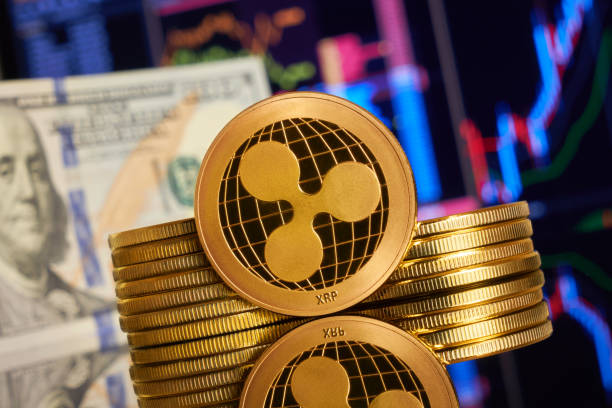Should You Buy XRP (Ripple) Before Jan. 20?
- Bitcoin Drops to $70,000. U.S. Government Refuses to Bail Out Market, End of Bull Market or Golden Pit?
- Gold rallies further beyond $5,050 amid flight to safety, dovish Fed expectations
- Bitcoin Bottom Debate: $70,000 or $50,000?
- Bitcoin Slips Below 75,000 Mark. Will Strategy Change Its Mind and Sell?
- Bitcoin Rout. Bridgewater Founder Dalio Publicly Backs Gold.
- Ethereum Price Forecast: ETH faces heavy distribution as price slips below average cost basis of investors

In 2020, the U.S. Securities and Exchange Commission (SEC) sued a company called Ripple, alleging it was in breach of the law for the way it issued its XRP (CRYPTO: XRP) cryptocurrency. The two parties were locked in a fierce legal battle until it was partially resolved in 2024, but it isn't officially over yet (more on that in a moment).
XRP has a market capitalization of more than $150 billion as of this writing, which makes it the world's third most valuable cryptocurrency. But it was worth a mere fraction of that just a few months ago -- the token has soared more than 400% since Donald Trump's U.S. election win on Nov. 5.
Start Your Mornings Smarter! Wake up with Breakfast news in your inbox every market day.
Trump is forming what could be the most pro-crypto administration in U.S. history, so investors are speculating that Ripple's regulatory woes might soon disappear. Does that mean you should buy XRP before the president-elect takes office on Jan. 20?
XRP was designed for the Ripple Payments network
The global banking system is complex, and not every institution uses the same infrastructure to process transactions. Some large banks use the SWIFT (Society for Worldwide Interbank Financial Telecommunication) network to transfer funds to one another, but many don't, which can cause delays when settling transactions.
Ripple designed the Ripple Payments network to solve that problem. It standardizes payment protocols so banks can "talk" to each other even if they use different infrastructure. Put simply, they can use Ripple Payments to eliminate intermediaries and settle transactions with one another directly -- and instantly.
Ripple launched the XRP cryptocurrency to standardize those transactions. For example, an American bank might send XRP to a Korean bank instead of sending U.S. dollars, to bypass currency exchange costs and other transaction fees. The two banks can then convert their XRP to a fiat currency of their choice.
That means that, unlike most cryptocurrencies, XRP has a real use case that could support its value over the long term.
Why has Ripple faced so much scrutiny from the SEC?
There are 100 billion XRP tokens in existence. Around 57 billion are circulating in the market, where they can trade on crypto exchanges. The other 43 billion tokens are held by Ripple, which releases small quantities each month to meet demand from institutions.
Therefore, XRP is very different from a decentralized cryptocurrency like Bitcoin, which has a fixed supply ceiling and isn't controlled by any company or individual.
This is among the reasons the SEC sued Ripple in 2020, arguing that XRP should be classified as a financial security (like a stock or a bond). Issuers of securities must register them and operate under a strict set of rules, so this lawsuit posed serious consequences for Ripple's business.
But in August 2024, a judge ruled that XRP might only be a security in specific circumstances, like when Ripple is issuing new tokens to institutions. However, XRP might not be a security when it's used in transactions, or when it's traded on crypto exchanges. Ripple's punishment was a fine of $125 million, which investors viewed as a win -- but the SEC is appealing the decision, so the company could face several more years in court.
That's why XRP soared after Trump's election victory. The president-elect has already nominated Paul Atkins to run the SEC (pending Senate approval). Atkins is co-chair of an organization called the Token Alliance, which is an advocate for the crypto industry, so he is a big supporter of digital assets.
Under Atkins' leadership, it's possible that Ripple's battle with the SEC could come to a swift conclusion after Jan. 20.

Image source: Getty Images.
Should you buy XRP before Jan. 20?
Banks and financial institutions don't have to use the XRP token in order to use the Ripple Payments network. They can also transact in fiat currencies while retaining the benefit of instant settlements. That means the success of Ripple Payments won't necessarily translate into a higher value for XRP.
Therefore, while a friendlier SEC will almost certainly benefit Ripple, it might not drive as much upside in XRP as investors think. After all, despite its recent surge, the token still hasn't surpassed its record high of $3.40 from 2018.
It's entirely possible that XRP could continue to climb throughout 2025 based on positive investor sentiment alone. Having a pro-crypto U.S. government in office will be a powerful thing, especially if it comes up with new initiatives to benefit the industry. However, further upside in XRP, specifically, would be driven mostly by speculation, which isn't a recipe for sustainable long-term value.
Remember, XRP plunged by more than 90% after its peak in 2018, and there's nothing preventing that from happening again. As a result, although the token could move higher from here, I don't think it will be a safe investment before or after Jan. 20.
Don’t miss this second chance at a potentially lucrative opportunity
Ever feel like you missed the boat in buying the most successful stocks? Then you’ll want to hear this.
On rare occasions, our expert team of analysts issues a “Double Down” stock recommendation for companies that they think are about to pop. If you’re worried you’ve already missed your chance to invest, now is the best time to buy before it’s too late. And the numbers speak for themselves:
Nvidia: if you invested $1,000 when we doubled down in 2009, you’d have $345,467!*
Apple: if you invested $1,000 when we doubled down in 2008, you’d have $44,391!*
Netflix: if you invested $1,000 when we doubled down in 2004, you’d have $453,161!*
Right now, we’re issuing “Double Down” alerts for three incredible companies, and there may not be another chance like this anytime soon.
Read more
* The content presented above, whether from a third party or not, is considered as general advice only. This article should not be construed as containing investment advice, investment recommendations, an offer of or solicitation for any transactions in financial instruments.





